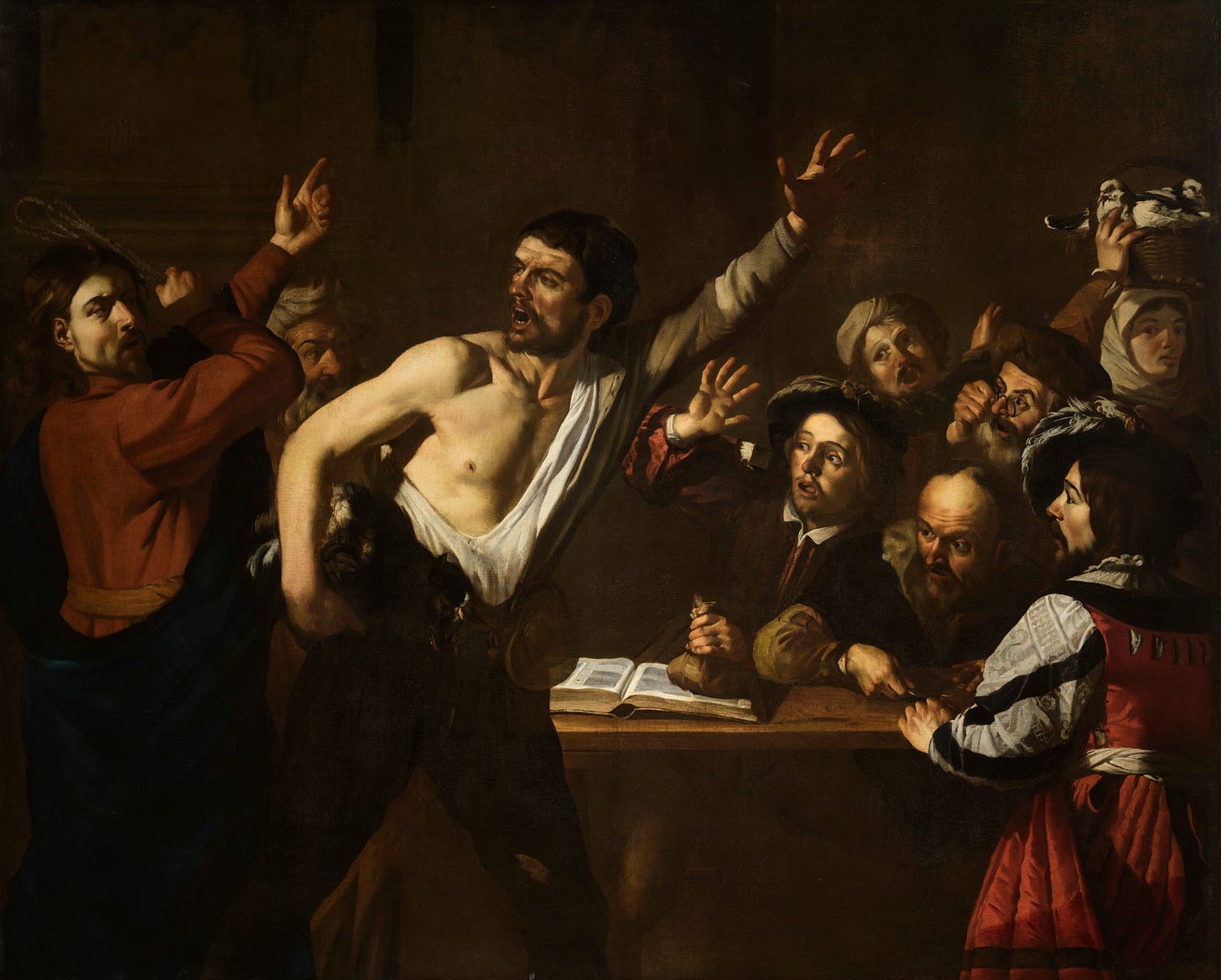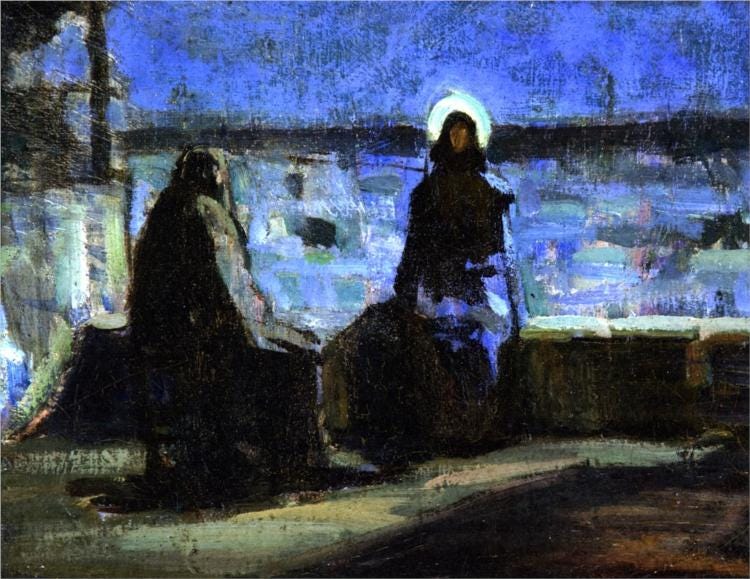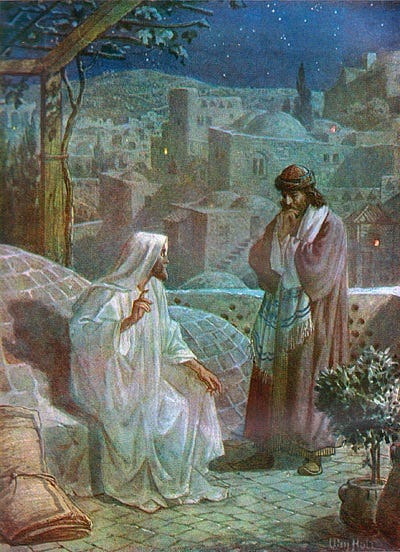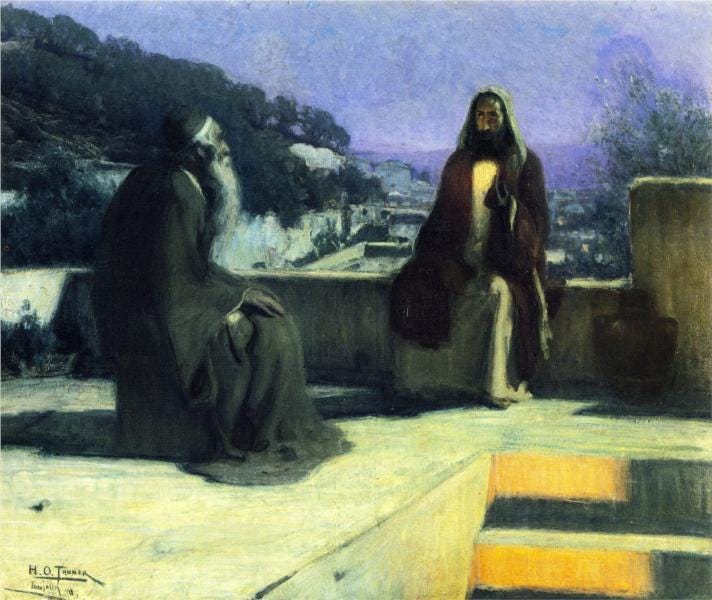Advent Day 11: Nicodemus
If there was a patron saint of Advent, it might be Nicodemus, a man whose spiritual journey begins in the dark of night and moves gradually toward the Light.
We meet Nicodemus in the Gospel of John, during Passover. Jesus is in Jerusalem then, one of thousands who’ve converged on the city for the annual pilgrimage. It’s a busy week for our man from Galilee. He shares confusing and controversial—some authorities even say blasphemous—teachings with the crowds. He hangs out with the lame and outcasts who come to him for healing. He loses his cool and drives the moneychangers from the temple.
All this rabble-rousing attracts the attention and anger of the religious elites who are often the targets of Jesus’s criticism. Nicodemus is one such elite: a Pharisee of the ruling class, and a member of the religious council. In other words, a big deal.
In true Advent fashion, Nicodemus makes his first appearance at night. Since his power depends on staying in the good graces of his priestly friends and fellow Pharisees as well as the Roman occupiers, it’s understandable that his first move toward Jesus is made under cover of dark. Nicodemus risks a lot by seeking out this free-spirited wisdom teacher from Galilee—not just from Pharisees and Romans, but also from friends and family. But, perhaps, like all true seekers in all times and places, Nicodemus understands that by not going he risks far more: never knowing deep truth and liberation. So, he sets off.
To get to Bethany, where Jesus stayed during Passover week, Nicodemus travels the shadows of Jerusalem’s narrow passageways, slips out the city gates then crosses the Kidron Valley. If this was a movie he’d be wearing sunglasses to disguise himself. Once in Bethany, he knocks nervously on a door, is admitted, then shown into the presence of the itinerant Galilean preacher.
Seated across from Jesus in the moonlight, Nicodemus says:
Teacher, some of us have been talking. We know you are a holy man, for the signs you are doing are proof that God is with you.
Did you catch that:
Some of us…
We know…
Nicodemus is not alone. He knows others who are Christ-curious. I’ve sometimes even wondered if Nicodemus and his compadres decided someone had to go check this guy out, and so they cast lots and Nicodemus lost (or won!). Or maybe not. Maybe Nicodemus really did go to Jesus without telling a single soul, in need of something new, a change, carrying with him what we all carry: a longing for wholeness, a wish to be healed of what hurts.
In any case, Jesus jumps right into things by giving Nicodemus a riddle to chew on:
I tell you the truth: only someone who is born again can see the kingdom of God.
Jesus talks a lot about the kingdom of God. It’s the term he uses for his Way of sacred living and lovingkindness. And he warns to not go looking for it here or there because it is already in us and among us. But we can only enter that kingdom by transforming our lives…being born again.
Nicodemus takes this literally.
I’m a grown man. How can someone be born again? Am I to crawl back into my mother’s womb for a second birth? That’s impossible!
Jesus deepens the teaching:
What is born from flesh is flesh; what is born from Spirit is spirit. Don’t be shocked by my words. I’m just telling you the truth. Even you, an educated and respected man, must be reborn by the Spirit to receive the kingdom of God.
Instead of even you, Jesus might have said especially you. We all resist whatever threatens our worldview, preconceived notions, dualistic either/or thinking, and privileged position. But those who hold power, like Nicodemus, often cling tighter than most. As an astute observer of human nature and psychology, Jesus would have known this, and known Nicodemus’s stumbling blocks.
The Galilean rabbi goes on:
The wind blows all around us as if it has a will of its own; we feel and hear it, but we do not understand where it has come from or where it will end up. Life in the Spirit is as if it were the wind of God.
What Jesus is trying to get Nicodemus to understand is that this thing—this kingdom/kin-dom thing—is not something Nicodemus can control. He can’t buy it or study up on it. It’s not about getting credentialed. It’s not transactional. It’s not about being correct, or checking the right religious boxes. In fact, it’s not about religion at all! It’s about relationship…with God, neighbor, and all of creation. It’s about transforming your heart and training it toward the light of compassion, love, justice and mercy. It’s an inside-out job. And that’s why it’s so tough.
This kind of spiritual rebirth is at the core of all the great religious traditions. Here are just a couple others to pair with Jesus:
In order to eliminate the discriminating mind, there must be a complete “turning around” of one’s being at the deepest level of consciousness. Buddha
Achieve the state of a new-born child. Clear and purify inner vision. Lao Tzu
This is what Jesus meant when he said we must become like children—we must return to that open spaciousness of childhood, reclaim our curious beginners minds. It’s not about knowing. It’s about unknowing!
But this is a hard word for Nicodemus, and us. We spend all our lives learning facts, gathering information so we can build ourselves up, brick walls around our vulnerability, find out the answers we need in order to sort everything into in/out, good/bad, right/wrong. We resist the gray areas and not knowing.
Then we arrive—often around mid-life, but for some earlier, and some later (and some never)—at a point where gray is the dominant shade of our days. And that’s hard. Knowing exactly what we should think, feel and believe is much easier. And the entire culture shoves us in that direction. There is a “correct” diet, plan, product and political position for everything, and it’s all designed to convince us that down that path we will find the life we say we want to live.
But what if, rather than stressing over what we should think, feel, or believe—stressing over being certain about everything—what if we directed that energy to just being present to what is before us? To responding in love and grace, moment by moment? To living a heart-centered life of communion.
The life of communion is what Jesus was trying to show Nicodemus. But on that first meeting, our night traveler shows no obvious breakthrough. In fact, Jesus seems a bit frustrated, at one point shaking his head in wonder at how Nicodemus could rise in the religious ranks and yet not get the basics about the spiritual life.
But something was stirring inside Nicodemus’s heart, for the next time he pops up in the narrative is when his colleagues on the religious council want to arrest Jesus, and Nicodemus offers a word in the Galilean’s defense:
Does our law condemn someone without first giving him a fair hearing and learning something about him?
It’s not a ringing endorsement of Jesus—Nicodemus is still tentative—but it shows courage, pushing back against the structures that are the source of his social connections, power and prestige.
In response, his colleagues throw some ethno-centric shade his way:
Are you from Galilee too?
We see Nicodemus one last time, just after Jesus’s crucifixion. Then, in broad daylight, he brings spices to the tomb to embalm Jesus’s body. This is the moment of his bold coming out. There is no more dangerous time to be a Jesus follower than right now. Yet here Nicodemus is, in the Light, his spiritual transformation so far along now, he couldn’t turn back even if he wanted.
Nicodemus’s journey began in darkness and moved toward Light. It is the quintessential Advent journey. And while we can’t know for sure what happened after his “coming out”, there is a tradition he joined the Jesus movement, was baptized by Peter and John (which may explain why he shows up in John’s gospel), and was eventually exiled from Jerusalem by his former friends on the religious council. If true, it is a reminder that the kingdom life—the kin-dom life—Jesus invites us to comes with risk. It may not save us from anything, but it mysteriously sustains us through all things. And that’s always a risk worth taking.
Advent Practice
Music is one of the great joys of this season. Pop culture leans hard into songs about sleigh rides, decking halls and jingling bells. And they’re great! I love those tunes. My December would be incomplete without them. But we must admit they bear little relation to the reason for the season. Songs about the birth of Jesus—Silent Night, Away In A Manger, O Come All Ye Faithful—do speak to that, and they’re wonderful. In my opinion, you just can’t beat Mahalia Jackson singing O Little Town Of Bethlehem.
There’s also another, small but growing list of modern holiday songs that speak to the meaning of Jesus’s life and message. These songs comfort, but they also challenge us to more deeply consider who is Christ and what is Christmas. These songs have become increasingly important to me.
Today, I offer you links to a few. Think of them not in competition with the other holiday songs you love, but as a complement to them. For practice, listen to one of them while sitting still, eyes closed. If a line stirs something in you, write it down and then use it for a Lectio Divina, meditation or journaling exercise. Also, if you have songs of this nature that you love, please share them in the Comments section below.
Love Is Christmas by Sara Bareilles
Stables by Peter Mayer (Austin-based, Grammy-winning choir Conspirare also does a gorgeous version of Stables)
Everything’s Not Lost by Gregory Porter
The Rebel Jesus by Jackson Browne
It also may come as a surprise to some, but Advent music is a genre unto itself. Here are a few of my favorites:
O Come Emmanual/Come Thou Long Expected Jesus (live) by The Petersens. I love this medley of two classic Advent songs.
Advent At Ephesus by the Benedictines of Mary.
Advent Hymn by Christy Nockels (adapted from an 18th century hymn by Charles Wesley)
Holiday Happenings at Life In The City
If you are in or near Austin, you are most welcome to join us at our holiday gatherings. We are located at 205 East Monroe Street, one block east of South Congress in central Austin.
Dec 21, 7 pm: Blue Christmas, an intimate service for the darkest night of the year.
Dec 23, 6 pm: Christmas Eve-Eve candlelight service, an annual LITC tradition.
Dec 24, 11:15 am: LITC’s regular Sunday service.
Dec 31, 11:15 a.m.: A fun, casual service with cookies and coffee to welcome 2024.
Ready For More?
Read the Introduction to the 2023 edition of The Heart Moves Toward Light: Advent With The Mystics, Saints and Prophets.
Find more mystics, saints and prophets in our Archive.
Feedback
Did you catch a typo? Do you have suggestions for mystics, saints and prophets we might cover in the future? Leave feedback in comments section below or email Greg Durham at greg@lifeinthecityaustin.org.









My new advent favorite this year is Canticle of the Turning, an Irish reel tune with lyrics based on the Magnificat! We will sing it this 3rd Sunday of Advent for Gaudete/Joy Sunday: https://youtu.be/F9QeTmRCpW4?si=F2sFlcuvQiL_0tfp
I love the dimensions you add to that already fascinating story. Thanks for sharing!